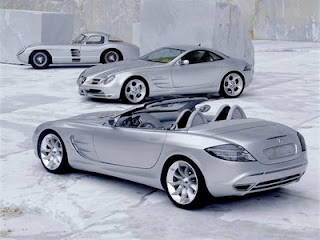
Launched in 1933, the sporty Mercedes Benz 380 was intended to bridge the gap between the six cylinder engined 290 model and the massive 770 'Grosser' model. It was the first car of its type with fully independent suspension; wishbones at the front and swing axles at the rear. The eight cylinder engine was directly derived from the 290's and could be ordered naturally aspirated or with the familiar engageable supercharger. In neither form did the 3.8 litre 'eight' produce enough power to move the heavy Mercedes Benz at sportscar speeds and the 380 was not a big seller.
These problems were somewhat resolved when Mercedes Benz replaced the 380 with the 500 K in 1934. As its name suggests, the new luxury sportscar was powered by a five litre version of the eight cylinder engine. This model came with the engageable supercharger equipped as standard. When engaged, the maximum output was boosted from 100 bhp to 160 bhp. Mated to either a four or a five speed gearbox, the all-iron engine was installed in a steel boxed-section frame. Like its predecessor, the suspension was independent all-round and stopping power was provided by hydraulic assisted drum brakes.
Unlike many of its competitors, Mercedes Benz actually delivered complete cars and not just rolling chassis for third parties to body. To accommodate the customers' specific wishes, the German manufacturer offered a wide variety of bodystyles that were built in their Sindelfingen based factory. The most exclusive of these was the two-seater Spezial Roadster that could easily be recognized by its V-shaped split front window. It was one of several open varieties, but there was also the choice of fixed-head coachwork of which the streamlined Autobahn Kurier was the most stylish.
The 500 K was ready in time for the 1934 Berlin Motorshow and it was in the German capital that the lavish Mercedes Benz found a fair share of customers. Many of the senior government officials used the eight cylinder during parades, but it was also very popular with the rich and famous. It still was by no means a sportscar as the 160 bhp available needed to move a car that weighed in excess of 2000 kg, regardless of the body fitted. It took nearly 20 seconds for the Tuetonic beast to reach 60 mph and considering that, the top speed of 100 mph does not sound too bad.
Production of the 500 K lasted over two years and then it was replaced by the larger engined 540 K, which was first shown during the Paris Salon in the fall of 1936. Again the type number immediately gave away the car's displacement figure. The 400 cc gain was good for an additional 15 hp without and 20 hp with the supercharger engaged. Not much changed to the line-up of open and closed body styles available, although an armoured version did become available, clearly anticipating the War. Right before WWII a second evolution was introduced with a 5.8 litre engine, but only handful of these 580 Ks were constructed.
Although the 500 K and 540 K were more popular than their predecessor only 342 and 319 respectively were constructed during the six years they were in production. Despite being very heavy to drive and rather slow, the eight cylinder cruisers are very highly regarded today. Especially in the concours d'elegance scene, where of course the show outweighs the go. Considered the quintessential 1930s production Mercedes Benz, the 500 K and 540 K are very expensive and a Spezial Roadster usually goes for seven figure prices.
Rarest of all factory fitted coachwork on the 500/540 K is the Autobahn Kurier fastback coupe. As the name suggest this bodystyle was originally developed to travel at high speeds on Germany's newly built highways. Ironically no German ever bought an Autobahn Kurier. The first example was shown at the 1934 Berlin Motor Show, presumably equipped with a 500 K engine. It is believed that only two examples were ever sold; one to the Shah of Persia and the second to a Spanish Professor called Ignacio Barraquer.
Both cars were fitted with the larger 540 engine but it is believed that the Shah's Autobahn Kurier was in fact the Berlin show car. It was shipped to Persia with an empty supercharger for reliability reasons. Professor Barraquer proved that the fully equipped 540 K was resilient enough to survive harsh desert conditions as he travelled through most of North Africa in 1938. The first car remains in Iran until this very day and has not been seen for many decades. The Spanish car was also unseen for many, many years until it was finally sold by the Barraquer family to the United States in 2004.
Immediately after arriving in North America, it was sent to master restorer Paul Russell. He meticulously prepared the exceptionally rare Mercedes Benz for the 2006 Pebble Beach Concours d'Elegance. Before the car was shown, it changed hands once more and joined the largest private Mercedes collection in the world. Needless to say, it was very well received at Pebble and won its class. It was one of the four nominees picked for the Best of Show award. In one of the most controversial Pebble results, the Autobahn Kurier lost to a Daimler Double Six Roadster.
After its 'debut' at Pebble, the aerodynamic 540 K went back into hiding until the 2008 Concorso d'Eleganza Villa d'Este. Here some of the injustice was flushed away as it was awarded the Coppa d'Oro, the best of show by public referendum.
Article by Wouter Melissen

















